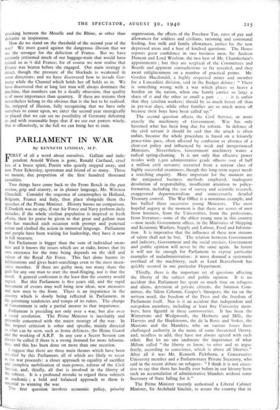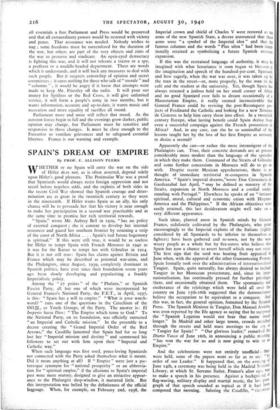PARLIAMENT IN WAR
By KENNETH LINDSAY, M.P.
FIRST of all a word about ourselves. Gallant and inde- pendent Arnold Wilson is gone, Ronald Cartland, cruel loss of a brave spirit, Porritt who quietly stepped away, and now Peter Eckersley, sportsman and friend of so many. These we mourn, due proportion of the first hundred thousand casualties.
Two things have come back to the Front Bench in the past session, grip and oratory, or in plainer language, Mr. Winston Churchill. Consider the sequence of catastrophes in Holland, Belgium, France and Italy, then place alongside them the speeches of the Prime Minister. History knows no comparison. If Dunkirk was an epic, if our Air Force and Navy perform daily miracles, if the whole civilian population is inspired to fresh efforts, then let praise be given to that great and gallant man who has matched each occasion with prompt and punctual action and clothed the action in immortal language. Parliament and people have been waiting for leadership, they have it now in full measure.
But Parliament is bigger than the sum of individual mem- bers and it knows the issues which are at stake, knows that its own existence for the time being depends on the skill and valour of the Royal Air Force. This fact alone haunts its deliberations and gives heart-searchings even to the most insen- sitive member. If there are guilty men, too many share the guilt for any one man to start the mud-flinging, nor is that the mood. A general confession is the least that the country would expect. But this Parliament is five years old, and the rapid movement of events may well bring new ideas, new measures and new men to the front. There is an impatience in the country which is slowly being reflected in Parliament, in the governing tendencies and tempo of its rulers. The change of Government is only a partial answer to that impatience.
Parliament is presiding not only over a war, but also over a social revolution. The Prime Minister is inevitably and Primarily concerned with the major strategy of the war. In this respect criticism is sober and specific, mainly directed to what can be seen, such as home defences, the Home Guard and the working of A.R.P. In any case a Secret Session can always be called if there is a strong demand for more informa- tion, and this has been done on more than one occasion.
I suggest that there are three main themes which have been revealed by this Parliament, all of which are likely to recur as the war proceeds: a closer approach to equality of sacrifice and complete mobilisation of man-power, reform of the Civil Service, and, thirdly, all that is involved in the liberty of the subject. It is a profound mistake to regard these subjects as academic ; a bold and balanced approach to them Is essential to winning the war. The first question involves economic policy, priority organisation, the effects of the Purchase Tax, rates of pay and allowances for soldiers and civilians, rationing and communal feeding, free milk and family allowances, justice for the new depressed areas and a host of kindred questions. The House reposes great confidence in two business men, Sir Andrew Duncan and Lord Woolton, the two best of Mr. Chamberlain's appointments ; but they are sceptical of the Committees and Boards and apparent contradictions so far revealed, and they await enlightenment on a number of practical points. Mr. Gordon Macdonald, a highly respected miner and member for a Lancashire division, said in the Budget debate: " There is something wrong with a war which places so heavy a burden on the nation, when one family carries so large a share of it and the other so small a part . . . it is unfair that they (civilian workers) should be so much better off than in pre-war days, while other families are so much worse off because their boys have been called up."
The second question affects the Civil Service, or more exactly the machinery of Government. War has only hastened what has been long due for reform. In defence of the civil servant it should be said that the attack is often unfair, because the whole procedure is based on a leisurely peace-time pace, often affected by confusion or absence of a clear-cut policy and influenced by weak and inexperienced Ministers. Nevertheless, Government machinery wants a radical spring-cleaning. It is not only that effective power resides with 1,300 administrative grade officers (out of half a million civil servants) recruited from a narrow class of highly successful examinees, though this long-term aspect needs a searching enquiry: More important for the moment are the antiquated business methods employed, inadequate devolution of responsibility, insufficient attention to policy- formation, including the use of survey and scientific research, exaggerated departmentalism and unnecessarily detailed Treasury control. The War Office is a notorious example, and has baffled three successive young Ministers. The most hopeful augury at the moment is that there are scores of men from business, from the Universities, from the professions, from literature—some of the ablest young men in this country —now inside Government offices, in the Ministries of Shipping and Economic Warfare, Supply and Labour, Food and Informa- tion. It is imperative that the influence of these new streams of talent shall not be lost. The relation between Government and industry, Government and the social services, Government and public opinion will never be the same again. In future it will not be enough for Parliament to expose particular examples of maladministration : it must demand a systematic overhaul of the machinery, such as Lord Beaverbrook has quickly secured in one particular Department.
Thirdly, there is the important set of questions affecting the liberty of the subject and public opinion. It is no accident that Parliament has spent so much time on refugees and aliens, detention of private citizens, the Swinton Com- mittee, the Silent Column, Cooper's Snoopers, the tax on the written word, the freedom of the Press and the freedom of Parliament itself. Nor is it an accident that independent and outspoken members, including at least five University mem- bers, have figured in these controversies. It has been the Wintertons and Wedgwoods, the Herberts and Hills, the Harveys and the Hopkinsons, the de la Beres and Stokes, the Maxtons and the Manders, who on various issues have challenged authority in the name of some threatened liberty, and, needless to add, they have not always agreed with each other. But let no one underrate the importance of what Milton called " the liberty to know, to utter and to argue freely, according to conscience, which is above all liberties." After all it was Mr. Kenneth Pickthorn, a Conservative University member and a Parliamentary Private Secretary, who said in the recent debate on refugees: " I think it is not exces- sive to say that there has hardly ever before in our history been such an accumulation of administrative blunders without some Secretary of State falling for it."
The Prime Minister recently authorised a Liberal Cabinet Minister, Sir Archibald Sinclair, to assure the country that in all essentials a free Parliament and Press would be preserved and that all extraordinary powers would be restored with victory and peace. That assurance was needed. Nobody wishes to nag ; some freedoms must be surrendered for the duration of the war, but others are part of the very objects and aims of the war to preserve and vindicate. An open-eyed democracy is fighting this war, and it will not tolerate a traitor or a spy, a profiteer or a muddle-headed department. These are words which it understands, and it will back any measures to deal with such people. But it suspects censorship of opinion and secret committees ; it cares nothing for those who talk of " morale " and " columns " ; it would be angry if it knew that attempts were made to keep Mr. Priestley off the radio. It will pour out money for Spitfires or the Red Cross, it will give unlimited service, it will form a people's army in two months, but it wants information, accurate and up-to-date, it wants music and recreation and more equality of sacrifice all round.
Parliament more and more will reflect that mood. As the autumn leaves begin to fall and the evenings grow darker, public opinion may change, but Parliament must be sensitive and responsive to those changes. It must be close enough to the Executive to ventilate grievances and to safeguard essential liberties. France is our warning and example.



























 Previous page
Previous page